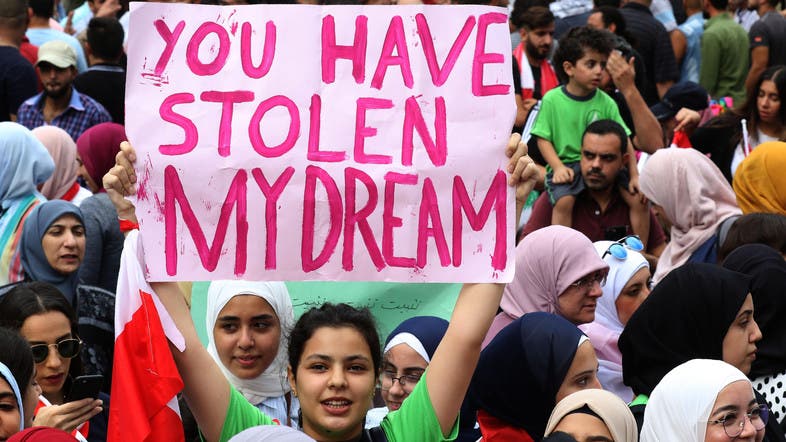Lebanon has entered its second week of demonstrations as President Michel Aoun is due to address the nation later on Thursday.
Protests which began a week ago have sustained momentum throughout the week, with demonstrators refusing to clear roadblocks across the country. Major protests are set for Beirut, Tripoli, and other major cities and towns.
Many roads and highways across the country remain blocked, including the major highways into Beirut, according to Al Arabiya’s correspondent.
Other roads have been cleared in the south of the country, including from Bint Jbeil to Nabatieh, which witnessed intense protests on Wednesday night. The Lebanese army has increased its presence in Nabatieh in response to attacks on demonstrators last night.
Aoun gives first address since protests
President Aoun gave his first major address since the outbreak of the protests at 1:30 p.m. Beirut time (2:30 p.m. Dubai time). Aoun refused to step down and said on that sectarianism and corruption had destroyed the country, in his first address to the nation since the outbreak of nationwide anti-government demonstrations last week.
“I heard many calls for the change of government; government cannot be changed overnight. It must happen through constitutional reforms,” said Aoun, who blamed corruption across all political parties and sectarianism for the “destroying” the country.
“I have taken Lebanon to a place of safety and stability,” claimed Aoun, after saying that “sectarianism and corruption have destroyed the country.”
Aoun pointed to corruption across all the political parties as causing the crisis and praised the reforms proposed by the government under Prime Minister Saad Hariri as the solution to the crisis.
“Let’s initiate a constructive dialogue where practical measures are taken to reach the best results. Dialogue is the best way to solution,” he added, concluding “I am ready to meet your representatives … to hear your demands.”
Aoun’s response was greeted negatively by many protesters who spoke to Al Arabiya English.
The government still in place
In the morning, Aoun receivied the UN Secretary-General’s Representative in Beirut, Jan Kubis, who briefed him on the position of the International Support Group on the current developments, according to a tweet by the official account for the Lebanese Presidency.
Along with all other major political parties, Aoun’s Future Patriotic Movement (FPM) has been targeted by the protesters, many of whom have demanded the resignation of the entire government. Aoun’s son-in-law Foreign Minister Gebran Bassil has been a particular target of protesters’ chants.
After Aoun, Walid Joumblatt, the leader of the Progressive Socialist Party and a former ally of Prime Minister Saad Hariri, is set to speak. Joumblatt has previously said the country needs a new, non-sectarian law, but that he is against the resignation of the government.
The only cabinet ministers that have resigned so far are four from the Lebanese Forces party.
Speaker of Parliament and head of the Shia Amal party Nabih Berri appeared to criticize the protests, saying Lebanon cannot withstand its current state of “suspension,” Lebanese Hezbollah’s al-Manar TV reported. There have been fears that Amal and Hezbollah supporters may try and attack protesters after a showdown with the Lebanese army on Monday.
Corruption charges, closed banks
Corruption and a worsening economic have been key causes of the protests.
Last night, Lebanese banks announced they would again remain closed on Thursday. Hariri managed to pass a reform package including a tax on banks on Monday, but protesters have largely ignored it.
The ratings agency Moody’s said the reforms are “credit negative” for Lebanon’s banking sector, amid an already struggling economy.
Lebanese prosecutors announced they were bringing corruption charges against former Lebanese Prime Minister Najib Mikati on Wednesday. Mikati denies accusations he receiving illicit gains from subsidized housing loans, and said that the allegations were motivated by his support for protesters and criticism of President Aoun’s government.
A US White House official said the Lebanese people are “rightfully angered” and that Washington supports their call for economic reform.
The Lebanese people have “expressed their legitimate anger” and reforms must be implemented in the country, said the British Embassy in Lebanon on Thursday.








































admin in: How the Muslim Brotherhood betrayed Saudi Arabia?
Great article with insight ...
https://www.viagrapascherfr.com/achat-sildenafil-pfizer-tarif/ in: Cross-region cooperation between anti-terrorism agencies needed
Hello there, just became aware of your blog through Google, and found ...